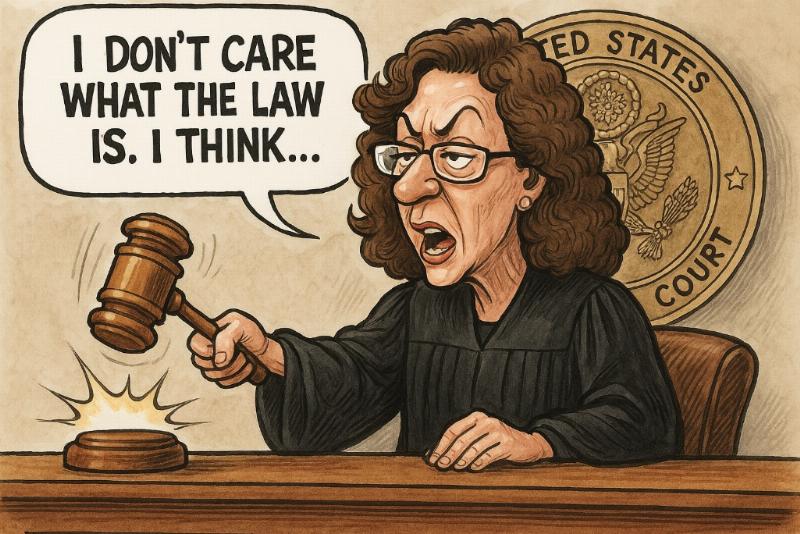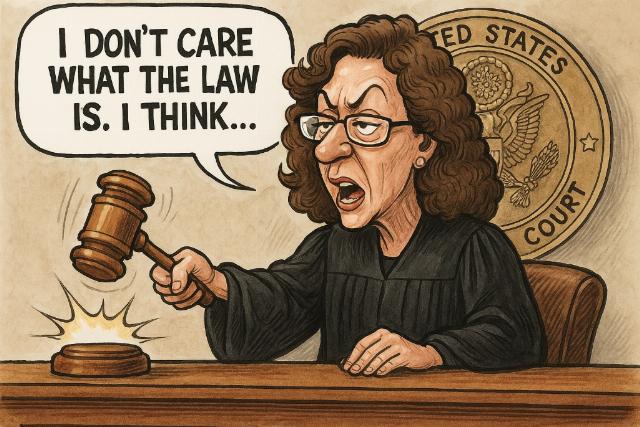


I started practicing law in 1987. Back then, we young litigators were told to be very careful that our arguments were correct, not just to prevent us from losing, but also to prevent us from inveigling an innocent judge into ruling in our favor, only to have that ruling overturned on appeal. Judges, experienced lawyers warned us, did not like being overturned because it made them look bad. Worse, they held grudges and would later take revenge against you, your firm, and your clients.
However, something interesting has happened in the Trump era: Lower court judges no longer have an ego investment in being appeal-proof. Instead, their ego is invested in left-wing judicial activism—which today means standing up against Trump—no matter how shoddy it makes their jurisprudence appear. Upper court judges are trying to warn them against it—most recently, Amy Coney Barrett in an essay at The Free Press—but these leftist judges are so entrenched in ideological warfare that it’s unlikely they’ll change course.

Image created using AI.
The Federalist reports that Democrats are open about the fact that they are using the federal court system to stop the Trump administration:
Democrat Party leaders invited an Atlantic reporter to tell the world their current political strategy is to use U.S. courts to reject the consequences of losing a presidential election. “The Anti-Trump Strategy That’s Actually Working,” say Michael Scherer’s Sept. 2 headline and subhed, is “Lawsuits, lawsuits, and more lawsuits.”
The vast majority of the nearly 400 lawsuits filed against the second Trump administration in its first seven months, Scherer reports, did not organically arise from American needs and on-the-ground realities. No, they were pre-planned in advance, and plaintiff cutouts recruited from Democrat constituencies including activist groups and labor unions. These lawsuits are cut-and-paste operations designed to deny American voters the results of electing a Republican president, using complicit blue-state judges who care nothing for the rule of law or Constitution.
Moreover, the Federalist article continues, “this strategy has been extremely successful.” At the lower court level, one carefully selected judge after another has blocked Trump’s efforts to deport violent illegal aliens, rein in academic antisemitism, shrink the federal bureaucracy, etc.
Thankfully, though, “extremely successful” may be a short-term phenomenon. While federal district court judges have enthusiastically taken it upon themselves to substitute their discretion for the president’s—a highly unconstitutional act in most circumstances—upper court judges have been less willing to go so far. Indeed, an essay published yesterday at The Atlantic bemoans the Supreme Court’s unwillingness to abide by lower court adjudications:
In lawsuit after lawsuit, President Donald Trump’s opponents have contested his claims of authority. To a very real degree, lower courts have been willing to step in and say no to Trumpian excess. The Supreme Court, by contrast, has demonstrated far more openness to letting Trump have his way.
Well, that’s one way to put it. Perhaps the Supreme Court is far more open to the rule of law.
And in an act of kindness toward rogue district court judges who are planning to usurp the duly-elected president’s constitutional and congressionally authorized power and discretion in all sorts of areas, Justice Coney Barrett very nicely reminded them that the way the law operates in America is that judges put aside their prejudices to apply the Constitution, legislation, and precedent to the facts before them:
As Thomas Paine put it, “[I]n America the law is king.” We judges don’t dispense justice solely as we see it; instead, we’re constrained by law adopted through the democratic process. We exercise authority that the people have given us and resolve disputes according to the ground rules that the people have prescribed. It’s a unique role created and defined by the Constitution.
[snip]
...[I]n our system, a judge must abide by the rules set by the American people, both in the Constitution and legislation. Thus, the most important question for a nominee is whether she will honor her commitment to do so. Though the confirmation process sometimes suggests otherwise, it shouldn’t matter what the nominee thinks about the death penalty, abortion, affirmative action, or any other politically charged topic. What matters is whether she will respect the people’s resolution of such issues.
[snip]
Like Americans more generally, judges hold diverse views about the values by which a just society should live. Yet under the Constitution, the choice between these competing views is made by citizens in the democratic process, not by judges settling disputes. On the bench, we must suppress our individual beliefs in deference to those that have prevailed in the enacted law. Our job is to protect the choices that citizens have made, even when we disagree with them.
Although the essay is framed as a way of explaining the law to ordinary people, I am certain that she is reminding lower court judges of their responsibility and the fate that awaits them if their personal decisions come before the Supreme Court. After all, she and her fellow justices have already repeatedly reprimanded that loose cannon, Ketanji Brown Jackson, who is now citing her own dissents as authority for her other dissents. She’s gotten so bad that even Justices Sotomayor and Kagan, who previously defined loony leftism, no longer want to be associated with her dissents.
But Brown Jackson, if she’s becoming a Supreme Court pariah, is also Exhibit A for how leftist judges think:
Magnus-Stinson asked Jackson how she decides to write a dissent.
“It’s because I feel like I might have something to offer and add, and I’m not afraid to use my voice,” said Jackson, noting that she’s not offended by other justices taking issue with her opinions because she has a “thick skin.”
In other words, Ketanji Brown Jackson, who was chosen for the Supreme Court because she was a black female judge with a pulse who wasn’t completely insane, has changed the permission structure for all leftist judges: She has put her imprimatur on the idea that substituting your own opinion and feelings about the law of the land is a badge of honor, thereby erasing the stigma once associated with having an upper level court slap you down.
These leftist judges, and their supporters in the Democrat party, dream of a “Kritarchy” or rule by judges. Thankfully, a few federal appellate courts and the United States Supreme Court are still holding the line.
However, if you’re thinking of being complacent and sitting out the 2026 election or if you have some areas of disagreement with Trump and want to use the election to slap him around a bit, let me remind you that a Democrat-controlled Congress means no more conservative judges. Moreover, if both the White House and Congress are Democrat controlled by 2028, a leftist Kritarchy that effectively destroys the Constitution will be the New World Order.
